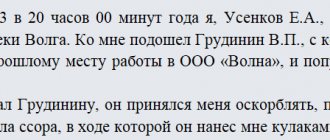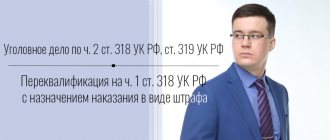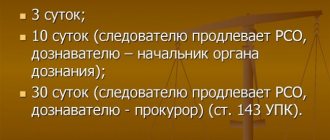Tweet
Criminal cases of private prosecution are initiated only at the request of the victim or his legal representative, with the exception of cases established by law. From the literal meaning of the provisions of Part 2 of Art. 20 of the Code of Criminal Procedure of the Russian Federation, it follows that criminal cases of crimes under Part 1 of Art. 115, part 1 art. 116, part 1 art. 128.1 of the Criminal Code of the Russian Federation are considered criminal cases of private prosecution.
However, upon further study of the content of this norm, it is discovered that to establish a criminal case of private prosecution, the qualification of a criminal act is not enough. According to the legislator, in order to determine a criminal case of private prosecution, one should take into account a set of characteristics, the characteristics of which are presented in Part 2 and Part 4 of Art. 20 of the Code of Criminal Procedure of the Russian Federation, but in the form of cases excluding private criminal prosecution.
Thus, the legislator for criminal cases of private prosecution has provided for signs characterizing the subject of the crime, indicating them in paragraphs. 1 and 2 hours 1 tbsp. 147, part 1 art. 318, part 1.1, part 1.2 art. 319 of the Code of Criminal Procedure of the Russian Federation, as cases excluding the criminal cases under consideration, but not reflected in Part 2 of Art. 20 Code of Criminal Procedure of the Russian Federation.
These legal provisions, which formulate criminal cases of private prosecution and criminal prosecution in a private manner, have not found proper legislative support in Part 2 of Art. 20 of the Code of Criminal Procedure of the Russian Federation, and therefore many mistakes are made in practice.
Distinction between criminal cases of private and public prosecution
In part 1 of Art. 20 of the Code of Criminal Procedure of the Russian Federation specifies “the nature of the crime committed” and “the gravity of the crime committed” as criteria for distinguishing criminal cases of private, private-public and public prosecution. These signs do not allow a clear distinction between criminal cases of private, private-public and public prosecution.
In criminal law, the nature of the public danger of a crime is determined by the object at which the criminal act is directed. Criminal acts related to criminal cases of private prosecution are characterized by a generic object - a social relationship that protects the individual, since these crimes are placed in section. VII of the Special Part of the Criminal Code of the Russian Federation entitled “Crimes against the person.” The specific object of these crimes is life and health (Chapter 16 of the Criminal Code of the Russian Federation), the direct object of intentional infliction of slight harm to health without qualifying signs (Part 1 of Article 115 of the Criminal Code of the Russian Federation) is health; beatings without qualifying signs (Part 1 of Article 116 of the Criminal Code of the Russian Federation) - bodily (physical) integrity; slander (part 1 of article 128.1 of the Criminal Code of the Russian Federation) - honor and dignity.
It should be noted that these objects of criminal legal protection also characterize crimes classified as criminal cases of public prosecution.
The concept “seriousness of the crime committed” used by the legislator is apparently associated with categories of crimes (Article 15 of the Criminal Code of the Russian Federation). Criminal acts provided for in Part 1 of Art. 115, part 1 art. 116, part 1 art. 128.1 of the Criminal Code of the Russian Federation, relate to crimes of minor gravity. For the commission of crimes classified as criminal cases of private prosecution, the criminal law does not provide for punishment in the form of imprisonment.
Other criminal offenses of minor gravity, provided for by the Criminal Code of the Russian Federation, also fall into the category of criminal cases of public prosecution.
To distinguish between criminal cases of private and public prosecution, a set of indicators should be taken into account. Along with the qualification of crimes provided for in Part 1 of Art. 115, part 1 art. 116, part 1 art. 128.1 of the Criminal Code of the Russian Federation, it is necessary to take into account the signs specified by the legislator in the form of cases provided for in Part 4 of Art. 20 of the Code of Criminal Procedure of the Russian Federation, and additional signs contained in paragraph 2, paragraph 2 and part 2 of Art. 147, part 1 art. 318, parts 1.1 and 1.2 art. 319 Code of Criminal Procedure of the Russian Federation.
When analyzing the norms of Part 4 of Art. 20, pp. 1 and 2 hours 1 tbsp. 147, part 1 art. 318, parts 1.1 and 1.2 art. 319 of the Code of Criminal Procedure of the Russian Federation identifies the signs of the subject of the crime. Studying the norm of Part 4 of Art. 20 of the Code of Criminal Procedure of the Russian Federation shows the presence of signs of a victim of a crime.
Identifiable signs of the subject of the crime and the victim of the crime, provided for in Part 4 of Art. 20, pp. 1 and 2 hours 1 tbsp. 147, part 1 art. 318, parts 1.1 and 1.2 art. 319 of the Code of Criminal Procedure of the Russian Federation are in direct connection with the reasons why the victim cannot protect his rights and legitimate interests on his own.
Ignoring at least one of the signs may lead to incorrect identification of the type of criminal case and the subsequent procedure for criminal prosecution (incriminating the criminal).
Consequently, the basis for distinguishing criminal cases of private prosecution and public prosecution at the stage of their establishment during the consideration by police officers of a report of an alleged crime or the receipt of an application directly to the magistrate should take into account a system of signs that includes:
- qualification of the crime provided for by the Criminal Code of the Russian Federation;
- reasons that determine the victim’s ability to defend his rights and legitimate interests in criminal proceedings independently.
At the same time, the reasons that determine the ability of the victim to independently protect his rights and legitimate interests in criminal proceedings are not exhaustive; they consist of material and procedural characteristics of the subject of the crime, the person affected by the crime and other characteristics.
Before a criminal case is initiated, a person affected by a crime does not have the procedural status of a private prosecutor or victim.
In criminal cases of private prosecution, the victim, if the magistrate makes a decision to accept the application for his proceedings, will acquire the procedural status of a private prosecutor, and in criminal cases of public and private-public prosecution, he acquires the status of a victim from the moment the decision is made to recognize him as a victim.
What sanction for defamation of a citizen is regulated by the article of the Criminal Code of the Russian Federation?
Until January 1, 2012, punishment for libel was regulated by:
- Art. 129 of the Criminal Code of the Russian Federation;
- then lost force on the basis of Law No. 420-FZ of December 7, 2011.
Afterwards, the standard returned to the Criminal Code of the Russian Federation in an amended version.
For libel, Art. 128.1 in criminal law. Unlike the other norm, its current variation has several parts that provide for different circumstances and methods of disseminating disgraceful information, and also separates their content. At the same time, the sanctions became stricter.
Liability under criminal law for libel will not provide for sanctions in the form of restriction of freedom, but the amount of fines that reach 5 million rubles, or strict employment in social work is also not a happy prospect.
Distinction of criminal cases of private prosecution according to the qualification of the crime
The literal meaning of Part 2 of Art. 20 of the Code of Criminal Procedure of the Russian Federation, the legislative formulation “criminal cases of crimes provided for in Articles 115 part one, 116 part one, 128.1 part one of the Criminal Code of the Russian Federation are considered criminal cases of private prosecution” reveals one of the criteria for establishing a criminal case of private prosecution - the qualification of a criminal act.
The importance of establishing at the early stages of considering a report of a crime the correct classification of a criminal act under the relevant article of the Special Part of the Criminal Code of the Russian Federation is enormous, since this sign is one of the criteria for establishing the type of criminal case that affects the subsequent procedure for criminal prosecution and bringing to criminal responsibility the person who committed the crime.
Due to the fact that victims in alleged criminal cases of private prosecution most often turn to the police department, the actions of its employees determine the choice of the type of criminal prosecution, respect for the rights of crime victims and reasonable time limits for bringing the subject of the crime to criminal responsibility.
Consequently, authorized officials must take into account the expansion of the list of investigative and other procedural actions that they have the right to carry out during the verification of a report of a crime and immediately assign them in accordance with Art. 1 tbsp. 144 of the Code of Criminal Procedure of the Russian Federation, a forensic medical examination of a person affected by a crime in order to “receive an expert’s opinion within a reasonable time.”
In law enforcement activities, investigators are in no hurry to order forensic medical examinations, despite the legislative provisions. Investigators issue referrals for a forensic medical examination of the victim for crimes against life and health, provided for in Ch. 16 of the Criminal Code of the Russian Federation, despite the fact that the norm of Part 1 of Art. 144 of the Code of Criminal Procedure of the Russian Federation does not establish the production of such a procedural action.
A forensic medical examination is carried out by a specialist, based on the results of which a report is drawn up. The report of the forensic medical examination cannot be considered as evidence, since such an action is not enshrined in Part 1 of Art. 144 of the Code of Criminal Procedure of the Russian Federation and the norms of chapters 24–27 of the Code of Criminal Procedure of the Russian Federation.
Norm part 1 art. 144 of the Code of Criminal Procedure of the Russian Federation establishes the right of subjects of criminal jurisdiction to conduct an examination, which is an investigative action, the procedure for which is provided for in Art. 179 of the Code of Criminal Procedure of the Russian Federation in cases where a forensic examination is not required.
An expert opinion received within a reasonable time, which is in accordance with Part 2p. 3 tbsp. 74, part 1 art. 86 and part 1 of Art. 144 of the Code of Criminal Procedure of the Russian Federation with evidence allows us to establish the correct qualification of a criminal act as one of the criteria for distinguishing a criminal case of private prosecution and a criminal case of public prosecution.
For displaying rough treatment of animals on Internet resources, they will be imprisoned for five years.
The flayers face up to five years in prison if the State Duma passes the draft on November 8, 2022 in several readings. In particular, the greatest under Part 1 of Art. 245 of the Criminal Code of the Russian Federation for rough treatment of animals, carried out out of selfish or illegal actions, using sadism or in the presence of a child, as a result of which the animal died or was injured, deputies put forward a proposal to increase from six months of arrest to 3 years of imprisonment.
The law provides for the following penalties:
- Penalties up to 80 thousand rubles. or in the amount of profit of the culprit for a period of up to six months.
- 360 hours of forced labor.
- 1 year imprisonment.
- Up to six months of imprisonment.
In the situation of the adoption of Law 245 of the Criminal Code of the Russian Federation, a more severe punishment is regulated. Today, the article contains points for the same criminal acts as in Part 1, but undertaken by a group of citizens with or without prior agreement with an organized group.
Today the greatest punishment under Part 2 of Art. 245 of the Criminal Code of the Russian Federation provides for two years of restriction of freedom. Deputies explain the importance of strict criminal liability measures for rough treatment of animals by the fact that they cause suffering to a huge number of people.
Classifying actions of this category as unlawful acts of moderate gravity and the severity of criminal liability for them will make our society only a little righteous.
Evil practice in private prosecution cases
According to the legislator, a person who has suffered from a crime must know information about the person who committed the crime against him. If the person who committed the crime is unknown, then, in accordance with the current legislation, the criminal case does not belong to cases of private prosecution.
The Code of Criminal Procedure of the Russian Federation does not contain an interpretation of the concept of “person whose details are unknown.”
There is no legal explanation of what is specified in clause 4, part 5, art. 318 of the Code of Criminal Procedure of the Russian Federation, the concept of “data about a person brought to criminal liability,” which must be reflected without fail in the victim’s application to initiate a criminal case of private prosecution addressed to the magistrate.
These circumstances lead to different understandings by magistrates of data about a person brought to criminal liability. By this data, justices of the peace understand the last name, first name, patronymic, date, month and year of birth, place of residence or place of registration; There are often cases when magistrates require that in an application the details of an identification document of a person being prosecuted.
If a victim of a crime classified as a criminal case of private prosecution contacts the police department, and officials identify signs of a criminal case of private prosecution, the inspection material is sent to the magistrate with a decision to transfer the message to the court (Clause 3, Part 1, Article 145 Code of Criminal Procedure of the Russian Federation). In this case, the inspection material contains, as a rule, a statement to bring a person to criminal responsibility, addressed to the head of the police department, since it served as the reason for conducting the inspection.
Under such circumstances, the magistrate, on the basis of Part 1 of Art. 319 of the Code of Criminal Procedure of the Russian Federation issues a resolution to return the application to the person who submitted it, in which he invites him to bring the application into compliance with the requirements of the law if the submitted application does not meet the requirements of parts 5 and 6 of Art. 318 Code of Criminal Procedure of the Russian Federation. It is clear that the victim’s statement does not meet the requirements, since it does not contain the name of the court to which it is being submitted; it is addressed to the head of the police department.
In practice, there are cases of illegal return by magistrates of inspection materials to the police department in order to bring the statements of victims into compliance with the requirements of Parts 5 and 6 of Art. 318 of the Code of Criminal Procedure of the Russian Federation, without issuing a judicial act in the form of a resolution.
Such actions by the magistrate may impede the victim's access to justice.
The magistrate does not have the authority to return the material with the victim’s statement to the police department and did not carry out the actions provided for in Part 1 of Art. 319 of the Code of Criminal Procedure of the Russian Federation. At the same time, the Code of Criminal Procedure of the Russian Federation does not assign to the inquiry body the obligation to bring the application to initiate a criminal case of private prosecution into compliance with the requirements of parts 5 and 6 of Art. 318 Code of Criminal Procedure of the Russian Federation.
Resolution to refuse to initiate a criminal case due to the absence of a statement from the victim on the basis of paragraph 5 of Part 1 of Art. 24 of the Code of Criminal Procedure of the Russian Federation, an authorized official has the right to issue an order if the victim refuses to write a statement addressed to the head of the police department to verify the report of a crime.
As a rule, after a report of beatings and other violent acts is received at the police department's duty station, the operational duty officer passes this message on to the local police commissioner (less often to the detective and investigator), who interviews, that is, receives explanations from the victim and other persons involved in the proceedings procedural actions during the consideration of a crime report, and also accepts a statement from the victim. The application is subsequently registered by the operational duty officer at the KUSP.
Under such circumstances, in practice, cases are not excluded when officials of the police department, in the event of identifying the details of the person who committed the crime, during the proceedings with persons brought to the police department, can inform the victim of the surname, name, patronymic, date, month, year and place birth, place of residence of the above person.
The application form is provided to the victim by an authorized official, who most often suggests the content of the application to bring the person to criminal responsibility.
Sample crime report
If you encounter unlawful behavior by an investigator:
In cases where the victim “resolved” the issue with the offender, and an application for “revocation” was filed, this is an unconditional basis for closing criminal proceedings.
You might be interested in:
Lawyer's blog
Conflict of interest in the legal profession
Read more
Lawyer's blog
What happens to a trademark after the liquidation of a company?
Read more
Lawyer's blog
Emphyteusis agreement as an alternative to the land purchase and sale agreement
Read more
Lawyer's blog
Deviation from the principle of proportionality of distribution of legal costs
Read more
Lawyer's blog
Secrets of criminal lawyers
Read more
Lawyer's blog
Signs of a “risky” lawyer, how to recognize them
Read more
The specifics of such proceedings are contained in Chapter 36 of the Code of Criminal Procedure of Ukraine.
Signs of criminal cases of private prosecution.
It is possible to highlight the signs that are indicated by the legislator in paragraph 2 of part 1 of Art. 147, part 1 art. 318, part 1.2 art. 319 of the Code of Criminal Procedure of the Russian Federation, but for unclear reasons were not reflected in Part 2 of Art. 20 Code of Criminal Procedure of the Russian Federation.
The first sign is a special subject. If the subject of the crime provided for in Part 1 of Art. 115, h. 1 tbsp. 116, part 1 art. 128.1 of the Criminal Code of the Russian Federation, falls into the category of persons specified in Art. 447 of the Code of Criminal Procedure of the Russian Federation, it cannot be considered a subject of criminal liability in a criminal case of private prosecution. This conclusion suggests itself from the analysis of clause 2, part 1, art. 147, part 1 art. 318, part 1.2 art. 319 Code of Criminal Procedure of the Russian Federation.
Norm part 1 art. 318 of the Code of Criminal Procedure of the Russian Federation determines that criminal cases involving crimes specified in Part 2 of Art. 20 of the Code of Criminal Procedure of the Russian Federation, are initiated against a specific person by submitting an application to the court by the victim or his legal representative, except for the cases provided for in paragraph 2 of part 1 of Art. 147 Code of Criminal Procedure of the Russian Federation.
In accordance with clause 2, part 1, art. 147 of the Code of Criminal Procedure of the Russian Federation in relation to persons (a separate category of persons) specified in Art. 447 of the Code of Criminal Procedure of the Russian Federation, proceedings are carried out in the manner established by Art. 448 Code of Criminal Procedure of the Russian Federation.
If the application is filed in relation to the person specified in clause 2, part 1 of Art. 147 of the Code of Criminal Procedure of the Russian Federation, then the magistrate refuses to accept the application for his proceedings and sends the said application to resolve the issue of initiating a criminal case in the manner established by Art. 448 of the Code of Criminal Procedure of the Russian Federation (Part 1.2 of Article 319 of the Code of Criminal Procedure of the Russian Federation).
However, these signs of a special subject of a crime, which exclude private criminal prosecution, have not received legislative recognition in Part 2 of Art. 20 of the Code of Criminal Procedure of the Russian Federation, which contains the concept of a criminal case of private prosecution.
The number of special subjects in criminal cases of private prosecution, the establishment of which excludes legal proceedings in the manner of private prosecution, includes:
1. persons who committed crimes in a state of insanity or who, after committing a crime, developed a mental disorder that makes it impossible to impose punishment or carry it out;
2. persons who committed crimes classified as criminal cases of private prosecution as minors;
3. persons who have committed crimes classified as criminal cases of private prosecution, by a group of persons, by a group of persons by prior conspiracy.
So, in accordance with Part 1 of Art. 434 of the Code of Criminal Procedure of the Russian Federation in criminal cases in relation to those specified in Part 1 of Art. 433 of the Code of Criminal Procedure of the Russian Federation for persons who have committed crimes in a state of insanity or who, after committing a crime, have developed a mental disorder that makes it impossible to impose a punishment or its execution, a preliminary investigation is mandatory.
Specified in Part 1 of Art. 434 of the Code of Criminal Procedure of the Russian Federation, cases excluding the existence of a criminal case of private prosecution, did not find legislative regulation of the establishment of a criminal case of private prosecution in Part 2 of Art. 20 Code of Criminal Procedure of the Russian Federation.
In accordance with Part 2 of Art. 420 of the Code of Criminal Procedure of the Russian Federation, proceedings in a criminal case of a crime committed by a minor are carried out in the general manner established by parts 2 and 3 of the Code, with the exceptions provided for in Chapter. 50 Code of Criminal Procedure of the Russian Federation.
Proceedings in criminal cases of private prosecution involve the implementation of criminal prosecution in a special procedure for the trial of a criminal case on the merits, provided for in Chapter. 41 Code of Criminal Procedure of the Russian Federation.
If it is established that a minor has committed a crime classified as a criminal case of private prosecution, in our opinion, we should talk about the transition of a criminal case of private prosecution to the category of public prosecution.
In practice, there are cases of committing crimes under Part 1 of Art. 115, part 1 art. 116, part 1 art. 128.1 of the Criminal Code of the Russian Federation, by two or more persons.
Although the legislator indicated in Part 6 of Art. 318 of the Code of Criminal Procedure of the Russian Federation the wording “the application is submitted to the court with copies according to the number of persons against whom a criminal case of private prosecution is initiated”, when a crime is committed against the victim in complicity, it is difficult for him to protect his rights and legitimate interests independently and support a private prosecution in court.
It turns out that the victim, who does not have legal knowledge, will have to draw up an application to initiate a criminal case of private prosecution against each person who committed a crime against him, determine the nature and degree of participation of each person in the commission of the crime and take into account other circumstances necessary for the magistrate to assign punishment for a crime committed in complicity, in case of failure to achieve reconciliation.
The second sign is the characteristics of the victim. For criminal cases of private prosecution, the following characteristics of the person affected by the crime are taken into account:
1. The absence of a dependent state of the person against whom the crime was committed, specified in Part 2 of Art. 20 Code of Criminal Procedure of the Russian Federation.
2. The absence of a helpless state of the person against whom the crime was committed, specified in Part 2 of Art. 20 Code of Criminal Procedure of the Russian Federation.
3. The absence of reasons preventing the person against whom the crime was committed, specified in Part 2 of Art. 20 of the Code of Criminal Procedure of the Russian Federation, protect your rights and legitimate interests independently in private.
These signs of a victim, in fact, refer to reasons that exclude the possibility of the victim to independently defend his rights and legitimate interests in criminal proceedings, and when they are identified, the existence of a criminal case of public prosecution is seen.
For the protection of their rights and legitimate interests, victims of crimes provided for in Part 1 of Art. 115, part 1 art. 116, part 1 art. 128.1 of the Code of Criminal Procedure of the Russian Federation, has the right to apply to:
1. to the magistrate with an application to initiate a criminal case of private prosecution to resolve the issue of initiating a criminal case in the manner established by Art. 318 Code of Criminal Procedure of the Russian Federation;
2. to the police department.
Practicing lawyers rightly note that, as a general rule, the injured person submits an initial statement to the police department, and not to the magistrate.
Legislative characteristics of a criminal case of private prosecution in Art. 20 of the Code of Criminal Procedure of the Russian Federation gives rise in practice to different interpretations and, in fact, complicates the access of victims of crimes to justice.
This is confirmed by the following, in our opinion, unfavorable statistical picture of criminal proceedings in private prosecution. The number of verification materials received from the police department with statements from victims, for which it is determined that there is a criminal case of private prosecution, remains consistently high.
At the same time, in the general structure of materials in the category of criminal cases of private prosecution, a low percentage of applications accepted for processing by the magistrate, which determine the moment of initiation of a criminal case of private prosecution, is revealed.
It is important that the subjects of the criminal jurisdiction of the system establish all the signs necessary for a criminal case of private prosecution.
Only after an official of a state law enforcement agency has established all the collectively necessary signs of the corresponding type of criminal case of private, private-public and public prosecution, should we talk about the further procedure for criminal prosecution and bringing the person who committed the crime to criminal responsibility.
Limitation period for criminal prosecution
Depending on the severity of the unlawful act, the statute of limitations is determined in Art. 78. Criminal Code of the Russian Federation.
After committing a crime, a certain period of time must pass.
- 2 years for minor offenses.
- For unlawful acts of particular gravity – 15 years.
- 10 years for serious violations of the law.
- 6 years for acts of moderate gravity.
The calculation of the period begins from the moment when the illegal act was carried out. It ends when the court makes a decision on the case and puts it into force of law.
When a person has committed an offense of particular gravity, for which imprisonment for life or the death penalty is imposed, and the statute of limitations for such a violation expires, the judicial authority has the right not to release the person from liability under criminal law.






